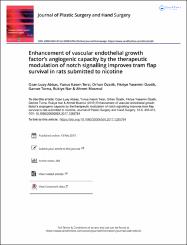Enhancement of vascular endothelial growth factor's angiogenic capacity by the therapeutic modulation of notch signalling improves tram flap survival in rats submitted to nicotine

Göster/
Erişim
info:eu-repo/semantics/closedAccessTarih
2017Yazar
Abbas, Ozan LuayTerzi, Yunus Kasim
Ozatik, Orhan
Ozatik, Fikriye Yasemin
Turna, Gamze
Nar, Rukiye
Musmul, Ahmet
Üst veri
Tüm öğe kaydını gösterÖzet
Background: Smoke of cigarettes, and specifically nicotine, has been shown to diminish pedicled transverse rectus abdominis musculocutaneous (TRAM) flap survival. Considering that Notch signalling through its ligand Delta-like 4 (Dll4) functions as anti-angiogenic factor by inhibiting the pro-angiogenic effects of vascular endothelial growth factor (VEGF), it is hypothesised that inhibition of the Notch would promote angiogenesis and increase TRAM flap survival in rats submitted to nicotine. Methods: Twenty rats were treated with nicotine for 28 days preoperatively. Thereafter, a pedicled TRAM flap was created in all animals. The Notch inhibitor N-[N-(3,5-difluorophenacetyl)-1-alanyl]-S-phenylglycine-t-butyl-ester was administered in animals of the treatment group. Animals in the control group were given the same amount of solvent. Five days after the surgery, viable flap areas were determined. Skin samples were evaluated for VEGF and Dll4 mRNA levels. Immunohistochemical analysis was used for the assessment of endothelial Dll4 expression. Vascular density was determined histologically. Plasma levels of VEGF and Dll4 were measured. Results: A significant improvement in TRAM flap surviving area was observed in the treatment group (53.5014.25%) compared with the controls (32.20 +/- 9.15%). Immunohistochemical analysis revealed a significant increase in the number of Dll4 stained vessels in animals of the treatment group (9.2 +/- 1.6) in comparison with the controls (5.7 +/- 1.9). VEGF mRNA levels (0.22 +/- 0.08) in the treatment group were significantly lower than those in the control group (0.36 +/- 0.09). Conclusion: Notch inhibition significantly improved TRAM flap survival in animals exposed to nicotine by promoting VEGF-induced angiogenesis.

















